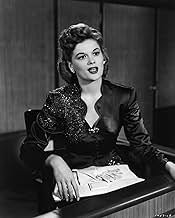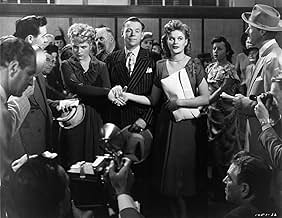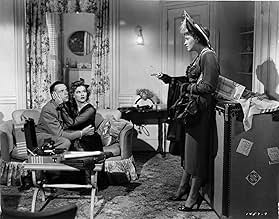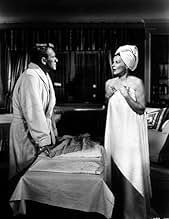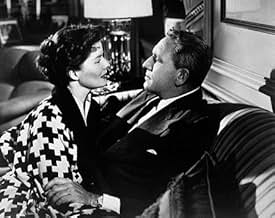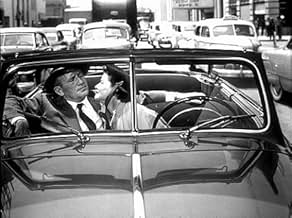NOTE IMDb
7,4/10
23 k
MA NOTE
Les tensions familiales et professionnelles augmentent lorsqu'un mari et une femme travaillent comme avocats opposés dans une affaire impliquant une femme qui a tiré sur son mari.Les tensions familiales et professionnelles augmentent lorsqu'un mari et une femme travaillent comme avocats opposés dans une affaire impliquant une femme qui a tiré sur son mari.Les tensions familiales et professionnelles augmentent lorsqu'un mari et une femme travaillent comme avocats opposés dans une affaire impliquant une femme qui a tiré sur son mari.
- Nommé pour 1 Oscar
- 1 victoire et 4 nominations au total
Edward Andrews
- Kip's neighbor
- (non crédité)
Bonnie Bannon
- Woman in Courtroom
- (non crédité)
Charles Bastin
- Young District Attorney
- (non crédité)
Harry Baum
- Commuter
- (non crédité)
Joseph E. Bernard
- Mr. Bonner - Adam's Father
- (non crédité)
Histoire
Le saviez-vous
- AnecdotesInspired by the real-life story of husband-and-wife lawyers William Dwight Whitney and Dorothy Whitney, who represented Raymond Massey and his ex-wife Adrianne Allen in their divorce. After the Massey divorce was over, the Whitneys divorced each other and married the respective Masseys.
- GaffesDuring the trial proceedings, a Black juror was in the first row, but the trial scene following the argument between Amanda and Adam where Adam walks out of the home, the jury makeup has now changed and the Black juror is not present. However the following day when court resumes for the jury verdict, the Black juror is back in the jury box.
- Crédits fousOpening credits are little curtains that go up and down, on a stage in a performance hall.
- Versions alternativesAlso available in a computer colorized version.
- ConnexionsEdited into Hollywood: The Dream Factory (1972)
- Bandes originalesFarewell, Amanda
(1949)
Music and Lyrics by Cole Porter
Played during the opening credits and often in the score
Sung by David Wayne (uncredited), accompanying himself on the piano
Reprised by the voice of Frank Sinatra (uncredited) on the radio
Whistled by Katharine Hepburn (uncredited)
Sung a cappella by Spencer Tracy (uncredited)
Commentaire à la une
Adam and Amanda Bonner are happily married, despite the sparky nature of their relationship. Lawyers each, both are interested in a newspaper report of a woman who shot (but not killed) her husband when she discovered him in the arms of another woman. The Bonner's take differing views of the case and it is no surprise that Adam ends up prosecuting while Amanda is Doris Attinger's defence counsel. With the gloves off in the courtroom with a legal battle of sexual equality, it is no surprise that the conflict and disagreements don't end at the front door and soon it is all kicking off.
The issue of sexual equality may have moved on from where it was in the middle of the last century but this film occasionally hits an interesting point, even if the majority of it is fairly shallow and a bit unconvincing in terms of legal argument. Without really engaging me, the film still held my interest as the story developed and it was fairly enjoyable even if it couldn't settle on whether or not it is a comedy or a courtroom "issue" drama; as it was I didn't think it did either brilliantly but did both well enough to make it work. I did expect more laughs because I thought it was going to be one of the screwball genre, but once I realised that it was more amusing than funny then I was able to settle into it.
One of the main reasons that the film has continued to last down the years is the chemistry between Tracy and Hepburn. Both are convincing as a couple in terms of romance, attrition, chemistry and other aspects of their relationship on screen. Tracy is tetchy and enjoyable but Hepburn is more than a match for him and she does it with style and real humour. Support is good from Holliday as well as Wayne's annoying neighbour. Mainly though it is Tracy and Hepburn's movie and they more than carry it between them.
Overall though this is not quite the classic that I had hoped it would be but it still did enough to make it work today. The courtroom stuff is not as dramatic or as relevant as it may have once been and the comedy is more of the sharp variety than the laugh-out-loud sort; however the chemistry between the lead two keeps it going and makes it worth seeing still.
The issue of sexual equality may have moved on from where it was in the middle of the last century but this film occasionally hits an interesting point, even if the majority of it is fairly shallow and a bit unconvincing in terms of legal argument. Without really engaging me, the film still held my interest as the story developed and it was fairly enjoyable even if it couldn't settle on whether or not it is a comedy or a courtroom "issue" drama; as it was I didn't think it did either brilliantly but did both well enough to make it work. I did expect more laughs because I thought it was going to be one of the screwball genre, but once I realised that it was more amusing than funny then I was able to settle into it.
One of the main reasons that the film has continued to last down the years is the chemistry between Tracy and Hepburn. Both are convincing as a couple in terms of romance, attrition, chemistry and other aspects of their relationship on screen. Tracy is tetchy and enjoyable but Hepburn is more than a match for him and she does it with style and real humour. Support is good from Holliday as well as Wayne's annoying neighbour. Mainly though it is Tracy and Hepburn's movie and they more than carry it between them.
Overall though this is not quite the classic that I had hoped it would be but it still did enough to make it work today. The courtroom stuff is not as dramatic or as relevant as it may have once been and the comedy is more of the sharp variety than the laugh-out-loud sort; however the chemistry between the lead two keeps it going and makes it worth seeing still.
- bob the moo
- 28 mai 2005
- Permalien
Meilleurs choix
Connectez-vous pour évaluer et suivre la liste de favoris afin de recevoir des recommandations personnalisées
Détails
- Durée1 heure 41 minutes
- Couleur
- Rapport de forme
- 1.37 : 1
Contribuer à cette page
Suggérer une modification ou ajouter du contenu manquant

Lacune principale
By what name was Madame porte la culotte (1949) officially released in India in English?
Répondre


